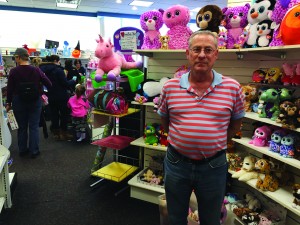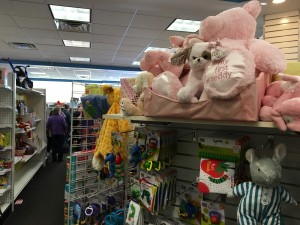Barry Schwartz, co-owner of Try & Buy Toys in Pleasantville, put it bluntly in an email to customers.
“Toys are losing their importance in our society,” he wrote. “Children and their parents are enthralled with technology and screens and choose that over traditional toys.”
“The biggest investment of our life no longer has value because it is now unsaleable.”
Schwartz let customers know Dec. 2 that after 42 years in business, the toy store he co-owns with his wife, Linda, will be closing its doors at the end of the month. Declining sales due to Internet competition, a landlord-tenant dispute and a shift in consumer demands all were factors in the decision to shutter the 5,000-square-foot store at 45 Washington Ave. the couple has owned since 1993. The downtown store has been continuously operated since 1973.
In May, Schwartz told the Business Journal that his Pleasantville store was in the midst of its worst two-year sales stretch in its history. Now, he said, sales have reverted back to 2005 levels while he is paying current-day expenses and it is simply not worth continuing business at a shop he called “far too large” to operate.
Contemplating retirement, Schwartz, 61, had hoped to sell the business to a husband and wife by June 1, but that deal fell through after the building”™s owner, Warren Schloat, president of Pleasantville-based Schloat Properties Inc., offered a maximum two-year lease. Some of Schwartz”™s CFO friends called that proposal “financial suicide.” They had hoped for a minimum seven-year lease, seeing as there is hundreds of thousands of dollars worth of inventory in the store.
Schwartz said Schloat took more than four months to offer the lease, which also delayed any possibility of a sale.
Schloat said he did not know who would fill the space going forward or if it would remain a toy store, but called Schwartz a “very good business guy.”
“We”™ll see what happens,” he said.
Schwartz, clearly passionate about the industry he joined in the 1990s as a transplant from the electronics world, made the closing announcement in both a four-page email to customers and a post on the store’s Facebook page. “It is with great sadness that we announced the closing of Try And Buy Toy Stores,” he wrote. “As you can imagine, this has been a very difficult decision to make after 40 years in business.”
The post has been shared more than 350 times on Facebook, and he has received dozens of comments both in-person and online from customers, many of who are or were parents of children in area school districts.
Yvonne Last has been buying educational toys, Lego, camp gear, Japanese toy collections, board games and “pretty much anything” at Try & Buy since 1997, both at its now-defunct Katonah location as well as at the Pleasantville store. The store also had locations in Bronxville and as a gift shop in Maria Fareri Children”™s Hospital at Westchester Medical Center, which closed in 2005 and 2006 due to lower prices offered by Internet retailers.
“It”™s sad for an affluent and educated community to be losing such a staple,” Last said. “There was an immediate need met for a busy mom like myself. Any of their sales reps could answer a question, and I knew I was supporting the local economy.”
Though Internet shopping can prove enticing during the holiday season, Last said she will now be doing her shopping at A Nu Toy Store in Tarrytown or at Little Things Toy Store in Park Slope, Brooklyn.
For Cathy Withrow Labick, a mother of four and customer of Try & Buy for 12 years, said the storeowners routinely contributed to nursery school fundraisers and called Barry and Linda Schwartz “warm and engaging.”
“I am also saddened that my kids are losing the experience that”™s comes with a local toy store ”” trying out the toys, seeing what”™s new, running into friends. Try and Buy”™s closing will leave a void in the community,” she said.
Schwartz anticipated closing by Dec. 24 or when his inventory runs out. All products ”” with the exception of Lego products, which are 20 percent off ”” are 30 percent off through closing. The largely extinct rubber dinosaur toys still occupy a shelf at the rear of the store. Ty”™s Beanie Babies, a staple of 1990s and 2000s childhoods across the country, hold a spot near the register.
Children have become enamored with electronics and the demand simply is not there for these kinds of toys, Schwartz said.
He said he would have to pay between $40,000 to $50,000 to update his credit card systems to new chip technology, an investment he knows he would not get back.
He said he couldn”™t raise the price any higher for products such as board games or stuffed animals because of the low demand. Even for those still buying them, they”™ve taken to the Internet for cheaper prices.
He said he has customers who come into the store, ask staff members for advice and try out toys before ordering them on Amazon while still in his store.
Former competitors like Toys “R” Us, scheduled to close its 110,000-square-foot Times Square store next year, and FAO Schwarz, which closed its flagship Fifth Avenue location in July, have now become allies in the fight against Amazon. Brick and mortar shops are all in the fight together, Schwartz said.
“What has Amazon ever done for Westchester? Do they collect sales tax? Donate to local charities? Provide jobs for kids?”
He said he still gets notes from former high school employees who stocked shelves or staffed the cash register thanking him for the opportunity before they began their careers. He said he feels “sick” about his 12 current employees being out of a job at the end of the month as well as other mom-and-pop businesses in Pleasantville”™s downtown that also benefited from his shop being a destination. There”™s also the award he received from the Pleasantville Chamber of Commerce hanging in the shop marking it as a staple of the community.
According to a January industry report by Toy Industry Association Inc., small businesses accounted for 96 percent of U.S. toy manufacturers, wholesalers and distributors in 2014. The industry last year supported 31,280 jobs, brought in $896.4 million in taxes and had an overall economic impact of $5.96 billion.
A September report by Australian business research company IBIS World determined that the $18 billion hobby and toy store industry is in the “declining stage of its life cycle.” The organization estimated that the toy industry would not be able to keep pace with inflation through 2020, largely due children”™s growing demand for electronics.
Merry Go Round, which occupied a storefront on North Avenue in New Rochelle for 65 years, closed its doors in April. Three other independent Westchester toy stores ”” Auntie Penny in Chappaqua, Child”™s Play in Scarsdale and Family Discount Center in Rye Brook ”” have closed since 2014.
One customer doing her holiday shopping asked a Try & Buy employee on a recent afternoon, “The Legos ”” they”™re a gift. Are they refundable?”
The employee answered, “Keep your receipt, and as long as we”™re still open, then yes, they are.”
Asked after what his advice was for a prospective independent toy store entrepreneur, Schwartz”™s answer was simple.
“Don”™t do it.”






















